Health
Swiss Town Prescribes Museum Visits for Mental Health Benefits

NEUCHATEL, Switzerland — Residents in Neuchatel are getting a unique prescription: visit the local museums for mental health benefits. Under a new pilot program, local authorities are covering the cost of ‘museum prescriptions’ for patients who could benefit from art exposure as part of their treatment plan.
The initiative aims to combat mental health challenges, boost well-being, and encourage physical activity through cultural engagement. According to Neuchatel council member Julie Courcier Delafontaine, the project underscores the importance of art, especially highlighted during the COVID-19 crisis when cultural venues were closed.
“With the closure of cultural sites during the pandemic, people realized just how much we need them to feel better,” she said.
The program, which began earlier this year, has already seen approximately 500 prescriptions distributed, with a modest budget of 10,000 Swiss francs (about $11,300) allocated for its duration. If successful, officials hope to expand the initiative to include other artistic activities like theater and dance.
The idea builds on evidence suggesting that art can significantly enhance mental well-being, reduce trauma effects, and lower risks associated with cognitive decline and premature mortality. Marianne de Reynier Nevsky, the cultural mediation manager who devised the program, stated that various patients, from those struggling with depression to individuals with chronic illnesses, could benefit from this approach.
“It could be a person with depression, a person who has trouble walking, a person with a chronic illness,” de Reynier Nevsky explained.
Dr. Marc-Olivier Sauvain, head of surgery at the Neuchatel Hospital Network, has already recommended museum visits to patients preparing for surgery, emphasizing the therapeutic nature of the experience.
“It’s wishful thinking to expect that simply telling them to walk or stroll will improve their fitness level. I believe these patients will benefit from museum prescriptions,” Sauvain said. “It’s very pleasant as a doctor to prescribe museum visits rather than medications or tests. To tell them, ‘It’s a medical order that instructs you to visit one of our beautiful city museums.’”
As local residents embrace this novel concept, some museum-goers are already seeing its potential. Carla Fragniere Filliger, a poet and retired teacher, supports the idea, believing it should be extended across the globe. “I think it’s a great idea,” she said during a recent visit to the Ethnographic Museum. “There should be prescriptions for all the museums in the world!”












